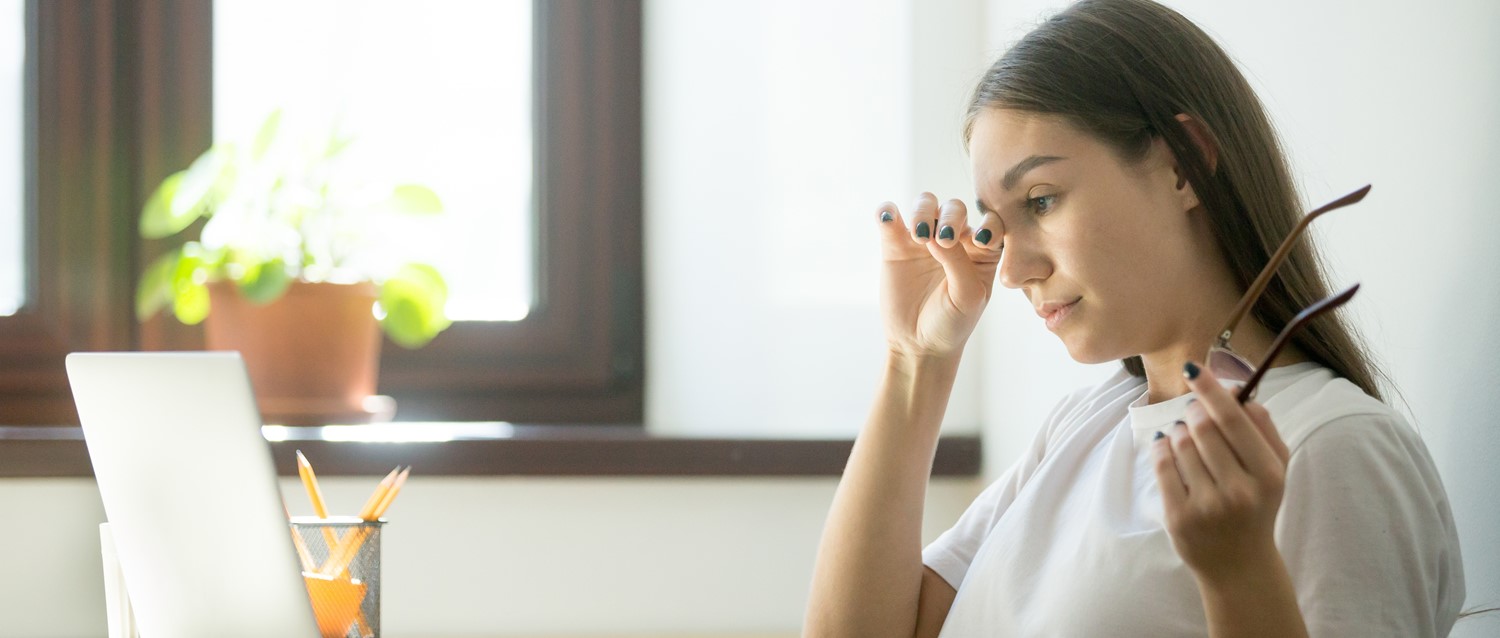
How to look after your eyes while working from home
Peer reviewed by Dr Sarah Jarvis MBE, FRCGPLast updated by Emily Jane BashforthLast updated 19 Jan 2022
Meets Patient’s editorial guidelines
- DownloadDownload
- Share
- Language
- Discussion
Eye strain has become increasingly common following advances in technology. 95% of households now own at least one mobile phone - yet just a generation (25 years) ago, more than 5 in 6 households didn't have a single mobile between them. As for computers, household ownership has increased from 27% in 1995 to almost 90% today. We're spending more time staring at screens, possibly more than ever now that many employees are working from home. However, it's important we don't let our eyes suffer as a result.
In this article:
Video picks
How can screen time affect your eyes?
Dr Sarah Jarvis MBE acknowledges that the explosion in digital technology has brought many benefits - access to a wider selection of information, quicker communication, easier contact with far-flung family - but it has downsides too, with one of the biggest victims being your eyes.
She explains that visual fatigue or digital eye strain (DES) is common and affects anything from 1 in 2 to 3 in 4 computer users.
Common symptoms include:
Tired eyes.
Soreness or aching.
Eye irritation.
Watering.
Burning.
"Even an hour of digital use without a break can be enough to bring these symptoms on, but the longer you use your computer continuously, the worse symptoms tend to be," says Dr Jarvis.
How has working from home affected our eyes?
Back to contentsA poll surveyed 2,000 adults who were working from home. Results found 1 in 3 have eye strain complaints by the end of each day, despite 1 in 10 having three or more lights blazing in their home office space.
Several participants also admitted the room they primarily work in has 'limited' natural light.
Poor lighting can not only harm the health of your eyes, but also cause headaches, lethargy and irritability. In turn, this can negatively affect your motivation levels and productivity.
Physical discomfort and tiredness can also be a result of various lighting effects given off by inadequate light sources, such as 'glare'. This occurs when one part of the visual field is much brighter than the average brightness field.
'Veiling reflections' are also a common cause of problems in home offices, and occur when a window reflects light on to your screen, shielding the text. This can result in visual fatigue.
A major issue with working from home is how employees often struggle with setting boundaries and achieving a healthy work-life balance. Their eyes are then affected as they feel pressure to be constantly connected to their work in some way, spending more time staring at their computer.
15% said they never take a screen break, and overall, each day spend nearly eight hours directly gazing at either a computer monitor or their phone.
A handful of respondents even thought their eyesight has noticeably worsened as a result of working from home.
Not only that, but several participants reported that the pandemic has stopped them from visiting the optician when contacted for a check-up over the last 12 months.
Continue reading below
What causes eye strain?
Back to contentsThere are two main reasons for computer eye strain.
Blinking troubles
"Most of us blink without noticing, but if you've ever taken part in a staring contest, you'll know how quickly your eyes become uncomfortable. That's because the surface of your eye needs constant lubrication to remove tiny specks of dirt and prevent the surface of your eye from feeling dry.
"Your eyes constantly produce a film of tears to provide this lubrication, and blinking spreads it over the front surface of your eye. This tear film is constantly evaporating, so needs to be replaced. If your eyes are irritated, you'll naturally blink more - this helps wash away any irritants from the eye surface," says Dr Jarvis.
When you’re using a digital device, you tend to blink up to three times less often. This can lead to:
Eye strain.
Headaches.
Dry eyes.
Pain in the neck and shoulders.
"Reading for long periods can actually have the same effect, whether you're reading a book or from a tablet," Dr Jarvis shares.
Squinting to see
The second most common reason for eye strain while using a computer is if you have to squint to see properly.
Dr Jarvis says you might find yourself naturally squinting if your device isn't at the right distance away from your eyes, or if your eyesight hasn't been checked and corrected.
Squinting can allow you to focus better, and reduce glare from a bright screen. However, it creates hard work for the muscles around the eyes, meaning an unfortunate side effect is more eye strain.
How can you reduce computer eye strain?
Back to contentsThe simplest, most obvious way to reduce your eye strain is to limit your screen time, or avoid digital technology altogether. However, this isn't realistic in today's society, especially when computers are a key aspect of many of our working lives.
However, Dr Jarvis offers a range of tips to minimise your risk of computer eye strain when using a computer, and to relieve symptoms.
Use regular lubricant eye drops - these can be extremely effective at relieving symptoms. Using preservative-free drops specifically reduces the risk of irritation or intolerance, and can reduce evidence of inflammation in the tear film.
See your optician for regular eye checks.
If you're prescribed glasses or contact lenses, wear them!
Keep your screen at the right distance from your eyes (about arm's length).
Follow the '20-20-20 rule' - every 20 minutes, take a 20-second break and focus your eyes on something at least 20 feet away.
Ideally, position your screen about 20 degrees below eye level - this means you'll be looking slightly down. This means your eyelids won't be fully open and will be covering (and protecting) more of the surface of your eyes.
Try to get into the habit of blinking regularly.
Consider a daily omega-3 fatty acid supplement (such as cod liver oil capsules) - while studies aren't conclusive, at least one study suggests they may improve the quality of tears, reducing evaporation and dry eye symptoms.
Continue reading below
What else can cause tired eyes?
Back to contentsIn order for your eyes to achieve optimum health, it's important to be aware of the factors that can cause issues.
Tired eyes can lead to soreness or aching, eye irritation, watering or burning. This in turn can lead to rubbing, followed by puffy skin or dark circles under the eyes.
As well as prolonged computer use, tired eyes can also be a result of:
(Not) sleeping soundly - so many adults struggle with insomnia, which may be caused by mental health problems, stress, family issues and being in pain.
A sensitive surface - Dr Jarvis explains how the surface of your eye has to be extremely thin and fragile to allow light through it. She says not blinking fully or often enough can prevent your tear film, which is required for lubrication, being spread over your eye surface effectively.
Thin skin - with the skin on your eyelids being the thinnest in the body (sometimes only 0.2 mm thick), it's very delicate. This makes it prone to irritation and eczema or dermatitis which, in turn, can cause puffiness and soreness.
How can you relieve dry eyes?
Back to contentsIn conjunction with reducing unnecessary screen time and practising good eye health while using a computer, there are other adaptations you can make to your lifestyle to relieve dry eyes.
Get better rest
"There's no easy solution to getting a better night's sleep. As a GP, I wish there were as it's one of the most common questions I'm asked about. Doctors very rarely recommend sleeping tablets, because of the health risks associated with them. But, that doesn't mean you have to resign yourself to poor sleep forever. Improving your 'sleep hygiene' can make a real difference," says Dr Jarvis.
Her tips for improving your sleep include:
Try cutting out caffeine (either by switching completely to decaf, or by avoiding it for six hours before bedtime. Don't forget that tea, many colas and chocolate, as well as coffee, contain caffeine).
Exercise regularly but avoid exercising in the evenings, as it can speed up your metabolic rate and make it hard to wind down.
Make sure your bedroom is really quiet and dark.
Remove ticking clocks and digital alarms which may tempt you to 'clock-watch'.
Keep digital devices from the bedroom - there's good evidence that 'blue light' emitted from mobile phones and tablets can disrupt your sleep pattern.
Avoid eating too late at night.
Try to get into a regular sleeping routine - don't be tempted to sleep in if you've had a disturbed night's sleep.
Avoid taking 'catnaps' during the day - these will leave you less tired at bedtime and can disrupt your body clock.
Warmth and relaxation
Dr Jarvis further suggests applying a warm compress or eye mask to help relieve puffiness, redness and tenderness.
"Taking time out to lie back with your eyes closed and light blocked out, while the warmth takes effect, can also be a useful way of relaxing, encouraging you to wind down before bed."
Patient picks

Eye health
How to live with severe eye floaters
Eye floaters are usually thought of as a nuisance rather than a chronic condition. But for some people they can significantly affect quality of life. So how do you learn to live with them - and what are the treatment options?
by Elizabeth Sulis Kim

Eye health
How to prevent dry eyes during winter
Dry eyes during winter are not uncommon, especially as the temperatures change and most of us crank up the central heating. While we can't control the weather, it is possible to prevent dry eyes or ease the often uncomfortable, irritating symptoms that accompany them.
by Lynn Stephen
Continue reading below
Article history
The information on this page is peer reviewed by qualified clinicians.
19 Jan 2022 | Latest version

Ask, share, connect.
Browse discussions, ask questions, and share experiences across hundreds of health topics.

Feeling unwell?
Assess your symptoms online for free
Sign up to the Patient newsletter
Your weekly dose of clear, trustworthy health advice - written to help you feel informed, confident and in control.
By subscribing you accept our Privacy Policy. You can unsubscribe at any time. We never sell your data.